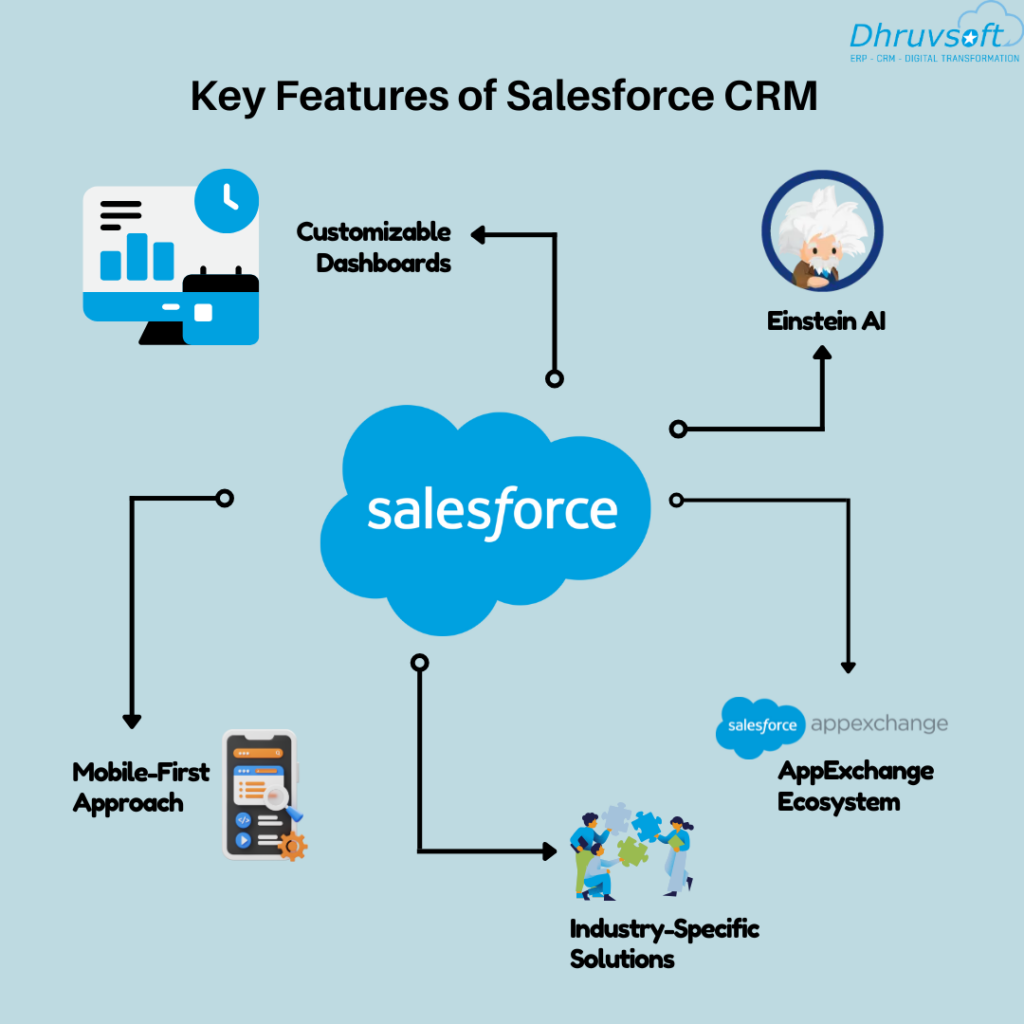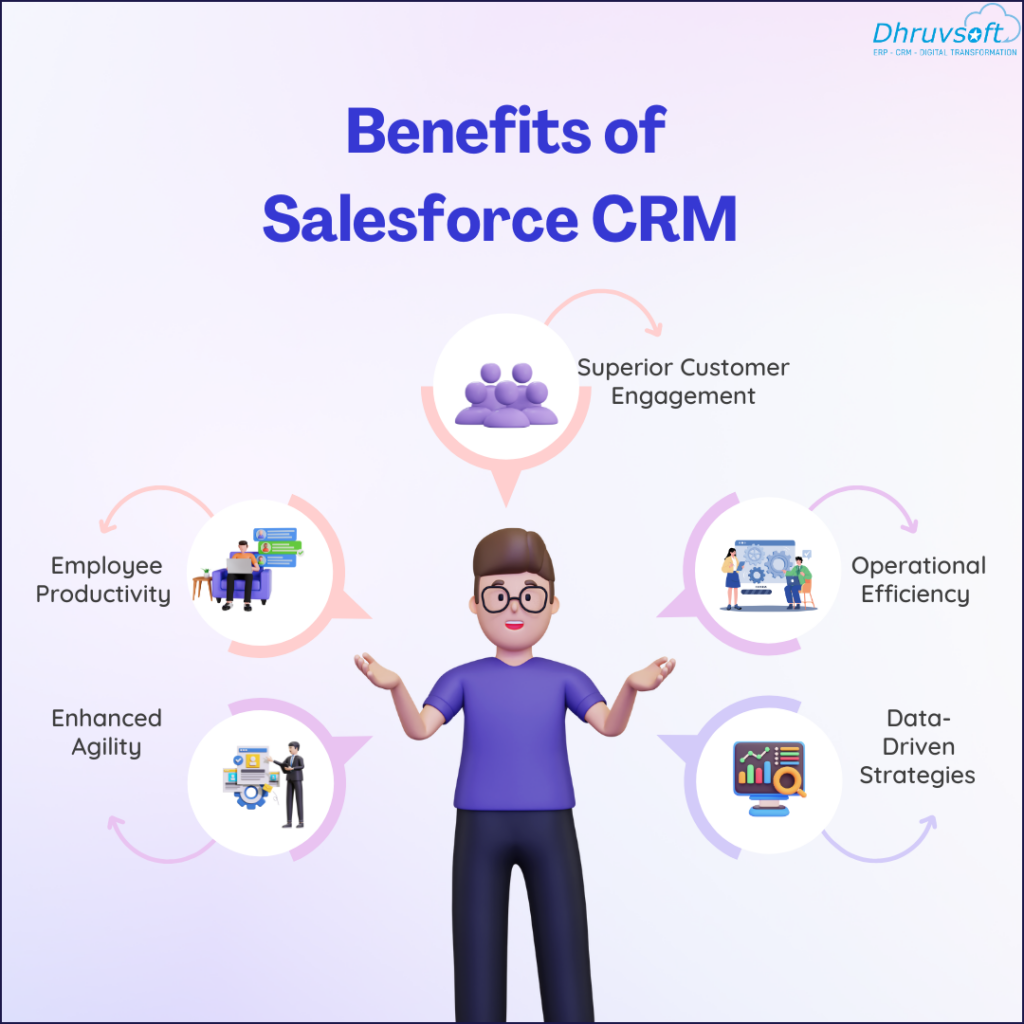In today’s hyper-competitive business environment, organizations are under immense pressure to innovate, streamline operations, and improve customer experiences. The term “digital transformation” encapsulates these objectives, involving a strategic overhaul of business processes to integrate digital technologies. The ultimate goal is to drive efficiency, agility, and superior customer engagement.
Central to digital transformation in any organization is Customer Relationship Management (CRM) software. A CRM system is no longer just a tool for tracking customer interactions—it has become the backbone of customer-centric strategies, enabling businesses to leverage data, automate processes, and foster seamless collaboration.
Among the leading CRM platforms, Salesforce CRM stands out as a powerful enabler of digital transformation. From its advanced AI capabilities to its industry-specific solutions, Salesforce equips businesses to navigate the complexities of the digital age effectively. This article dives deep into the pivotal role of CRM in digital transformation and highlights how Salesforce CRM can revolutionize business operations.

Understanding Digital Transformation
Digital transformation goes beyond the adoption of new technologies or just digitizing the manual process. It represents a paradigm shift in how organizations operate, engage with stakeholders, and deliver value. Businesses across industries are embracing this change to stay relevant and meet evolving customer demands.
What Drives Digital Transformation?
Several factors are compelling businesses to embrace digital transformation:
- Shifting Customer Expectations: Today’s customers expect real-time, personalized, and seamless interactions across multiple channels.
- Advancements in Technology: The rise of AI, big data, IoT, and cloud computing has created opportunities to innovate and improve efficiency.
- Global Competition: Companies need digital strategies to differentiate themselves in an increasingly competitive market.
- Regulatory Changes: Adapting to new regulations and ensuring compliance often requires robust digital solutions.
Key Challenges for Digital Transformation
Despite its advantages, digital transformation is fraught with several challenges:
- Legacy Systems: Outdated IT infrastructure can be a big roadblock in digital initiatives.
- Fragmented Data: Businesses need help to consolidate data from multiple sources.
- Change Resistance: Employees often resist changes to traditional workflows.
- Budget Constraints: Implementing digital solutions requires significant investment.
These challenges highlight the need for solutions that not only address operational inefficiencies but also enable customer-centric transformation.
How CRM Fuels Digital Transformation
A Customer Relationship Management (CRM) system plays a pivotal role in bridging the gap between technological capabilities and business objectives. Let’s explore how CRM systems facilitate digital transformation:
1. Centralized Customer Data
CRM platforms consolidate customer information from diverse touchpoints, providing a unified view. This centralization eliminates data silos and empowers teams with insights into customer behavior, preferences, and history.
2. Enhanced Customer Experiences
With a 360-degree view of customers, businesses can tailor interactions, anticipate needs, and resolve issues more effectively. Personalized experiences to customers lead to higher satisfaction and loyalty.
3. Process Automation
CRM systems can automate repetitive tasks such as data entry, email alerts, field updates, follow-ups, and reporting. The automation reduces manual effort, accelerates workflows, and ensures consistency.
4. Improved Collaboration
By serving as a central repository of customer data, CRMs foster collaboration across departments. Sales, marketing, and customer service teams can align their efforts to deliver seamless customer journeys.
5. Actionable Insights
Modern CRM platforms leverage AI and analytics to generate actionable insights. From predicting customer churn to identifying high-value leads, these insights drive informed decision-making.
6. Scalability and Agility
As businesses grow, their needs evolve and then require a more scalable and agile solution. Cloud-based CRM systems like Salesforce offer scalability and adaptability, ensuring long-term relevance.
Why Salesforce CRM?
Salesforce CRM has been at the forefront of innovation, consistently redefining the CRM landscape. Its comprehensive suite of tools caters to businesses of all sizes and industries, making it an indispensable asset in digital transformation.
Key Features of Salesforce CRM
- Einstein AI: Salesforce Einstein offers predictive analytics, automation, and intelligent recommendations, helping businesses stay ahead of customer needs.
- AppExchange Ecosystem: With thousands of third-party integrations, Salesforce ensures seamless workflows.
- Industry-Specific Solutions: From healthcare, retail, consumer goods, and manufacturing to Salesforce, Salesforce provides tailored solutions for unique industry challenges.
- Mobile-First Approach: Salesforce’s mobile app ensures that teams can access data and collaborate from anywhere.
- Customizable Dashboards: Businesses can create dashboards tailored to their specific KPIs and metrics.
Advantages of Salesforce in Digital Transformation
- End-to-End Integration: Salesforce integrates with ERP systems, marketing automation tools, and more, creating a unified ecosystem.
- Real-Time Data: Businesses can track customer interactions and campaign performance in real-time with the help of Salesforce products like Sales Cloud, Service Cloud, Marketing Cloud, and Commerce Cloud.
- Global Reach: Salesforce’s multilingual and multi-currency support makes it ideal for global operations.
The Benefits of Salesforce CRM
Salesforce CRM delivers tangible benefits that align with the goals of digital transformation:
1. Superior Customer Engagement
Salesforce enables businesses to deliver hyper-personalized experiences, building trust and loyalty.
2. Operational Efficiency
Automation of repetitive tasks and streamlined workflows allow companies to focus on strategic priorities.
3. Data-Driven Strategies
With real-time insights, businesses can make proactive decisions and respond to the latest market trends effectively.
4. Enhanced Agility
Salesforce’s scalable architecture ensures that businesses can adapt to evolving demands.
5. Employee Productivity
By simplifying complex processes, Salesforce empowers employees to achieve more with less effort.
Best Practices for Implementing Salesforce CRM
1. Conduct a Needs Assessment
Identify business challenges and objectives to ensure the implementation aligns with strategic goals.
2. Prioritize User Training
Invest in comprehensive training to help employees leverage Salesforce effectively.
3. Ensure Data Accuracy
Focus on cleaning and consolidating data before migration to avoid future complications.
4. Monitor Performance
Use Salesforce dashboards and reports to track KPIs and optimize processes continuously.
5. Engage a Trusted Partner
Collaborate with certified Salesforce implementation partners for a smooth deployment.
Future Trends in CRM and Digital Transformation
As technology continues to evolve, the future of CRM and digital transformation looks promising. Key trends include:
- AI-Driven Insights: CRM systems will increasingly rely on AI to offer actionable insights and automate decision-making.
- Integration with IoT: IoT-enabled devices will feed real-time data into CRMs, enabling proactive service.
- Voice-Activated Interfaces: Voice commands will simplify CRM navigation and enhance user productivity.
- Focus on Sustainability: CRMs will help businesses track and achieve sustainability goals through better resource management.
Conclusion
Digital transformation is no longer an optional requirement—it’s imperative. At the heart of this transformation lies CRM systems, which empower businesses to embrace change, innovate, and deliver unparalleled customer experiences.
Salesforce CRM stands out as a leader in this space, offering tools and insights that drive meaningful change. Whether it’s enhancing customer engagement, automating processes, or enabling data-driven decisions, Salesforce helps businesses unlock their full potential.
As your organization embarks on its digital transformation journey, consider leveraging Salesforce CRM to achieve your goals. Reach out to us to explore how Salesforce can revolutionize your business operations.

